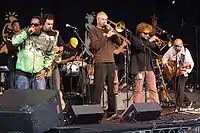Grammy Award for Best Latin Rock or Alternative Album
The Grammy Award for Best Latin Rock or Alternative Album (until 2020: Best Latin Rock, Urban or Alternative Album) is an award presented at the Grammy Awards, a ceremony that was established in 1958 and originally called the Gramophone Awards,[1] to recording artists for releasing albums in the Latin rock and/or alternative genres. Honors in several categories are presented at the ceremony annually by the National Academy of Recording Arts and Sciences of the United States to "honor artistic achievement, technical proficiency and overall excellence in the recording industry, without regard to album sales or chart position".[2]
| Grammy Award for Best Latin Rock or Alternative Album | |
|---|---|
| Awarded for | Best Latin rock or Latin alternative albums |
| Country | United States |
| Presented by | National Academy of Recording Arts and Sciences |
| First awarded | 1998 |
| Currently held by | Rosalía, El mal querer (2020) |
| Website | grammy.com |
The category was introduced in 1998 and has gone through a number of name changes:
- 1998-2008: Grammy Award for Best Latin Rock/Alternative Performance
- 2009-2011: Grammy Award for Best Latin Rock, Alternative or Urban Album (for which this category merged with the Latin Urban Album category)
- 2012: No Grammy was awarded (Grammy category was discontinued in a major overhaul of Grammy categories. That year, recordings in this category were shifted to the newly formed Best Latin Pop, Rock or Urban Album category.[3] )
- 2013-2020: Grammy Award for Best Latin Rock, Urban or Alternative Album
- 2021 onwards: Grammy Award for Best Latin Rock or Alternative Album
In June 2020, the Recording Academy announced a renaming and redefining of this category. Latin urban albums were moved to the newly named Best Latin Pop or Urban Album category, as the Academy stated that "the Latin urban genre, both aesthetically and musically, is much more closely related to the current state of Latin pop."[4]
Recipients



See also
References
- "Grammy Awards at a Glance". Los Angeles Times. Tribune Company. Retrieved April 24, 2010.
- "Overview". National Academy of Recording Arts and Sciences. Archived from the original on January 3, 2011. Retrieved January 19, 2011.
- Grammy Awards restructuring
- Grammy.com, 10 June 2020
- Strauss, Neil (January 7, 1998). "Grammy Nominations Yield Surprises, Including Newcomer's Success". The New York Times. The New York Times Company. Retrieved April 24, 2010.
- "Top Grammy nominations". The Register-Guard. Guard Publishing. January 6, 1999. Retrieved April 24, 2010.
- "Santana nominated for 10 Grammy Awards". Lodi News-Sentinel. January 5, 2000. Retrieved April 24, 2010.
- "43rd Grammy Awards". CNN. February 21, 2001. Archived from the original on November 6, 2008. Retrieved July 12, 2010.
- "Complete List Of Grammy Nominees". CBS News. January 4, 2002. Retrieved July 12, 2010.
- "45 Grammy Nom List" (PDF). Archived from the original (PDF) on 2012-04-26.
- "They're All Contenders". The New York Times. The New York Times Company. December 5, 2003. Retrieved July 12, 2010.
- "Grammy Award nominees in top categories". USA Today. Gannett Company. February 7, 2005. Retrieved July 12, 2010.
- "The Complete List of Grammy Nominations". The New York Times. The New York Times Company. December 8, 2005. p. 3. Retrieved July 12, 2010.
- "The 49th Annual GRAMMY Awards Roundup: Latin/World Fields". National Academy of Recording Arts and Sciences. Retrieved December 26, 2011.
- "Grammy 2008 Winners List". MTV. February 10, 2008. Retrieved July 12, 2010.
- "Complete List of Nominees for the 51st Annual Grammy Awards". E! Online. December 8, 2008. Retrieved December 26, 2011.
- "52nd Annual GRAMMY Awards Nominees And Winners: Latin Field". The Recording Academy. Retrieved December 10, 2011.
- "53rd Annual GRAMMY Awards Nominees And Winners: Latin Field". The Recording Academy. Retrieved December 10, 2011.
- "Grammy Awards 2012: Winners and nominees list". Los Angeles Times. Tribune Publishing. 2012. Retrieved July 20, 2015.
- List of 2013 nominees Archived 2012-02-01 at the Wayback Machine
- "56th GRAMMY Awards: Full Winners List". Billboard. Retrieved 2017-04-06.
- List of Nominees 2015
- "Grammy Awards 2016: See the Full Winners List". Billboard. Retrieved 2017-04-06.
- "59th Annual GRAMMY Awards Winners & Nominees". GRAMMY.com. Retrieved 2017-04-06.
- Lynch, Joe (November 28, 2017). "Grammys 2018: See the Complete List of Nominees". Billboard. Retrieved November 29, 2017.
- Grammy.com, 7 December 2018
- 2020 Grammy Awards nominations list
